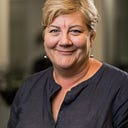Future Generations: 2020 is a pivotal year for our common future.
Today marks the final day of this year’s Annual Meeting of the World Economic Forum held in Davos, Switzerland. In its 50th year, the World Economic Forum’s mission statement of being ‘the foremost creative force for engaging the world’s top leaders in collaborative activities to shape the global, regional and industry agendas at the beginning of each year’ appears to be increasingly necessary.
Secretary-General Antonio Guterres, President Donald Trump, Chancellor Angela Merkel and HRH Prince Charles joined businesses and world leaders from across the globe to discuss pressing issues around climate change, the economy and technology.
This year marks the first time in its history that Davos has asked young people to attend and present at the forum. Milati Wisjen, one of the eleven young people invited to attend this year, had a poignant response to concerns that people in positions of power could give young people too much responsibility or put words into their mouths.
“We need to get rid of this sense of divide because we need to collaborate on all levels, we need to understand both sides of the story.” — Milati Wisjen
It is within this context that I feel compelled to elevate the voices of South Australian young people with the launch of their 2030 SDG Action Plan, devised in collaboration with UN Youth SA.
Young South Australian’s call to action is not dissimilar to those being made at Davos. Their 2030 SDG Action Plan asks adults to make decisions now that will build the future we all need and want. They want us to take an integrated and simultaneous approach to the challenges facing our people, planet, prosperity, peace and partnerships.
Their lifetime has been characterised by rapid and unprecedented civic, social, technological, environmental and political change. It is a backdrop by which many children and young people have forged different expectations of governments, institutions, and community organisations. Their values, identities and their individual and collective sense of self and belonging is different to those who have come before them.
As Commissioner for Children and Young People, I hear many of South Australia’s youngest citizens, questioning the decisions made by their great grandparents and grandparents. Particularly those in relation to the degradation of the environment which has unwittingly contributed to what is our climate crisis. They’re also deeply critical of the decisions their parents and other adults in their lives are making, who they view as complicit in stealing from future generations.
“The government needs to consider our future, they need to start making positive impacts on the environment, because at this rate, our job in the future will be to live with the impact that past generations have left on our Earth. The government needs to adress (address) things such as climate change and realise this isnt science fiction, its real life & if we don’t do anything about it soon, it will be too late.” — (17 year old)
My obligation to children and young people is to work on issues and agendas that they identify today. But I have recently come to believe my obligations should extend to protecting the rights and interests of future generations of children.
Children and young people have told me that inclusion matters, diversity matters, trust matters, personalised experiences matter, and emotions matter. They tell me that what they want are kind, empathetic interpersonal relationships with government, business and the broader community. They want us to be future focussed and to value equity, to take into account the most vulnerable in our societies and work on integrated solutions that address problems simultaneously and comprehensively.
“If we are able to empower the young of SA then they will believe in themselves and create a snowball effect and make the world a better place.” — (15 year old)
Young people are calling on us to take a sharper focus to address the complex issues we face, through a lens that integrates economic, social and environmental solutions. They want respect for future generations by challenging ‘short termism’ and instead sharpen our thinking to ensure it considers the impact our decisions will have on future generations which can be achieved by us taking a non-political approach to policy making now.
Most of us tend to see our actions as being good and sound, and therefore by default, protecting the interests of future generations. However, it is this thinking that has brought us to where we are now — facing an uncertain future. Without the rigour of thinking about the cost/benefits of today’s citizens versus those of future generations, we are likely to continue with policy that brings about favourable electoral outcomes rather than legislation and law that is actually required to secure our future.
We need to build our collective capacity for intergenerational planning. This involves finding ways to ensure the interests of future generations are prioritised. They need to be held up to policy makers who understand the importance of their actions now, for the benefit of tomorrow.
Long term strategic intentions in South Australia need to focus on building this intergenerational capacity. This could include new legislation like a ‘Future Generations Act’ to provide us with an independent safeguard for future generations through a sound legislative base.
This will force us to look beyond ‘short termism’ and populism to unite competing ideologies in the sustainability sphere, around the commonality of an agreed vision for the future. By doing so we will all be collaborators in building a State that we want our unborn children and young people to experience.
The first step: build a broad based intergenerational alliance around the need to consider the interests of future generations. Then, seek civil society, business and political support to progress this idea to demonstrate its relevance and the importance of the approach.
Anyone interested?
To read the SDG Action Plan head to:
